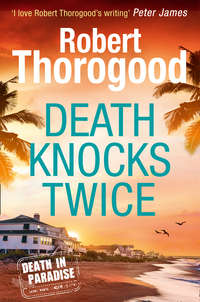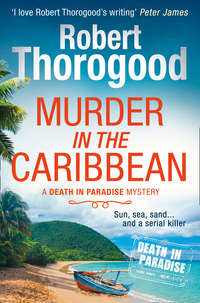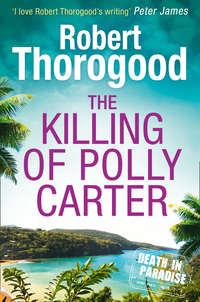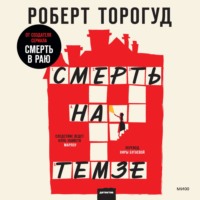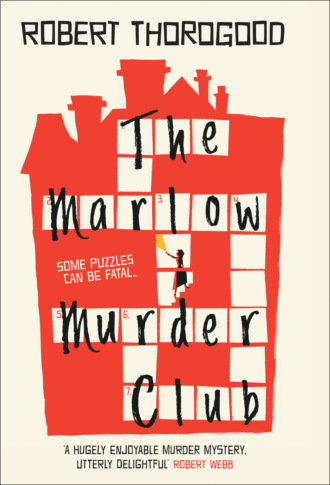
The Marlow Murder Club
She went down to her boathouse, approached an old punt that was half in and half out of the water and gave it a shove with her foot. She stepped up onto the back of it and grabbed the punting pole as the front of the boat bumped through the rotten boathouse doors and slipped out onto the river.
Despite her advanced years, Judith was an expert punter. With a flick of her wrists, she thrust the pole down into the riverbed, bent at the waist and pushed with all her might. As the punt shot forward, she twisted the pole up and out of the soft mud, and the boat had the momentum to cross the river.
Once she reached the further bank and the river was shallow again, it was no effort to punt upstream the fifty or so yards to Stefan’s house, use the prow of the punt to penetrate the wall of reeds that protected his riverbank, and step up onto his land. She didn’t need to secure the boat. Entirely surrounded by bulrushes, it wasn’t going anywhere.
Checking her watch, Judith could see that just over eight minutes ago, she’d been sitting in her house, and now here she was, at the sharp end of her neighbour’s mysterious disappearance.
Stefan’s house was really rather splendid to Judith’s mind. It was a converted watermill with a wooden wheel that still turned lazily, but differently sized rectangular glass windows had subsequently been cut into the building. It was both pleasingly old-fashioned and modern at the same time.
She went and looked at Stefan’s car in the driveway. Judith knew nothing about cars, and cared even less, so all she could tell was that it was grey in colour, and it was gleaming, not a spot of dirt on it anywhere. She could see no other tyre tracks in the gravel, or any other clues that suggested that perhaps Stefan had left the house in a different vehicle.
She went for a walk around the garden, trying to work out where the sound of the gunshot might have come from, but it was hard to place herself accurately when her only reference point was from a position in the river below the height of the bulrushes.
In fact, it took only a few minutes of walking around and inspecting the reed bed by the riverbank for Judith to realise that she didn’t even know what she was looking for. A drop of blood on a blade of grass? A muddy footprint?
Judith looked at the wooden wheel turning on the side of the house, and the millpond in front of it. Despite the heat of the day, the water here was dark and Judith shivered at the thought of it. There was something about still bodies of water that spooked her. Although, as she looked, she could see that the water wasn’t quite still. There was a slight current tugging at the surface. Where was the water going?
Judith walked around the edge of the pond until she saw that it fed into a river that was about ten feet across. Where the millpond ended and the river began, there was a narrow brick causeway that crossed from one side of the garden to the other.
Judith considered the river beyond the dam. It had to feed back into the Thames somehow. But it was hard to see exactly how, as Stefan had allowed this section of the garden to grow wild, and the water soon slipped under dense shrubs and bushes that crowded in from both banks.
With a sigh, Judith realised she’d have to follow the course of the river. She had to be thorough. So she pushed her way through the bushes, branches whipping her body, cobwebs sticking to her face and hair as she struggled to the other side.
Once there, Judith was disappointed. It was even wilder in this corner of the garden, but she could see that the river passed through some iron bars onto a concrete weir that fed the water back into the Thames. There was nothing of interest to see.
Although, as she regathered her breath after her exertions, she became aware of something in the air, a fetid smell, like an old compost heap. Was it the river? She looked down at the water flowing through the grille. An old tree branch was half submerged, blocking the water, and leaves had backed up.
But then Judith realised something.
It wasn’t a branch in the water.
It was a human arm.
It was reaching out of the water, the skin of the hand as white as marble. And, deeper still, Judith could just make out the body.
It was Stefan Dunwoody.
And in the centre of his forehead was a small black hole. A bullet hole.
Judith staggered back, her hand going to her neck.
She’d been right all along.
Stefan Dunwoody, her friend, her neighbour, had been shot dead.
Chapter 3
An hour later, Judith was sitting on a bench in Stefan’s garden being interviewed by Detective Sergeant Tanika Malik. The police officer was in her early forties, wore a smart trouser suit, and had an air of teacherly efficiency about her that Judith already found irritating.
‘But I don’t understand, Mrs Potts,’ DS Malik said. ‘You say you came back to Mr Dunwoody’s property?’
‘Yes,’ Judith said, her chin raised in defiance. ‘It’s like I told you on the phone. I knew I heard a shout and a gunshot last night. And if your police officer wasn’t going to investigate it properly, I thought that I should.’
‘Was there any other reason you returned?’
‘I don’t understand.’
‘Were you expecting to find a dead body?’
‘No, of course not.’
‘And yet, you did find one, didn’t you?’
‘Which is more than your officer managed, I can’t help noticing. Now tell me, did you know Stefan had a bust-up with a man called Elliot Howard a few weeks ago?’
‘I’m sorry?’
Judith told DS Malik about the local newspaper diary piece that described the argument at the Henley Royal Regatta between Stefan and the owner of the Marlow Auction House, Elliot Howard.
‘This was six weeks ago?’
‘That’s right.’
‘I see.’
DS Malik thought for a moment.
‘What is it?’ Judith asked.
‘Can I ask you a question? As Mr Dunwoody’s neighbour.’
‘Of course.’
‘Only, it’s standard procedure to cross-reference named subjects in witness reports with the police database. So I looked up Mr Dunwoody. He doesn’t have any kind of record. He owns the art gallery in Marlow, he lives on his own, it’s all as expected. But five weeks ago, he reported a burglary to us.’
‘He did? What was stolen?’
‘That’s the thing. He said he’d been out at a restaurant with friends, and when he got home he’d discovered someone had smashed a window and broken into his property. But by the time an officer arrived to take his statement, Mr Dunwoody had to admit that he couldn’t find anything that had been stolen.’
‘Nothing was stolen?’
‘That’s what he said. And yet it was very definitely a break-in. But his computer was still there. His collection of art. And I can tell you, Mr Dunwoody owns a number of oil paintings, and not one of them had been stolen.’
‘This was five weeks ago? A week after the bust-up Mr Dunwoody had at Henley?’
‘I suppose so. But did Mr Dunwoody mention the break-in to you?’
‘I haven’t spoken to Stefan in weeks, I’m afraid.’
‘Or did you see anything suspicious at the time? Maybe someone lurking near his property? Or a car parked by his house that looked different?’
‘I’m sorry, I didn’t. More’s the pity. The first I knew anything was wrong was when I heard him being murdered last night.’
‘Ah, now I’m really going to have to stop you there, Mrs Potts. You see, we don’t know for sure that someone shot Mr Dunwoody.’
‘I’m sorry?’
‘We don’t know Mr Dunwoody was murdered.’
‘Are you saying the bullet hole appeared in his forehead as if by magic?’
‘Well, no, but we can’t rule out that his death was a terrible accident. Or what if he did this to himself?’
‘You think he committed suicide?’
‘It’s a possibility.’
‘Poppycock!’
DS Malik blinked in surprise. Had the woman in front of her just used the word ‘poppycock’?
‘If he took his own life, the pistol would have dropped to the ground somewhere. Before he fell into the river. And I can tell you, when I was looking, I didn’t see a gun on the ground anywhere.’
‘Yes, I can see why you’d think that, but maybe the gun fell into the river after he’d shot himself. I’ve instructed divers to search the riverbed for it. In the meantime, you really mustn’t jump to any conclusions, Mrs Potts. We must let the evidence lead us, not our assumptions.’
Judith appraised DS Malik. The woman might be efficient, capable even, but she clearly lacked imagination. She was a typical ‘head girl’ type, Judith decided, not entirely kindly. But then, Judith had been expelled from the very posh boarding school she’d been sent to as a teenager. She’d also been expelled from the really-very-much-less-posh boarding school she’d been sent to next. And the one after that. Suffice to say, she and the head girls of the schools she’d attended hadn’t ever seen eye to eye.
Judith sighed to herself. Very well, if the police didn’t believe that Stefan had been killed, then she’d just have to investigate his murder for herself, wouldn’t she?
Once Judith had finished giving her formal statement, she stepped back onto her punt and, with a regal wave at the forensic officers in their paper suits as she passed, she allowed the river to carry her back to her house. She then got out her old bicycle and climbed onto it. After all, if she wanted to discover who’d killed her neighbour, there was an obvious place to start.
It was only a five-minute cycle along the Thames Path into the nearby town of Marlow, and for once Judith didn’t acknowledge the little nods and waves she got from complete strangers as she whizzed along. But then, she never knew why so many people waved to her at the best of times. It never occurred to her that she was considered something of a minor celebrity in the town. To her mind, there was nothing interesting about her life, and every time she professed herself confounded by someone’s interest in her, she only embellished her reputation for eccentricity even further.
Turning from the towpath into a little park with swings and slides, Judith saw a flock of pigeons pecking idly at the ground. Filthy creatures, she thought to herself as she sped up her bike, a big grin spreading over her face as she bore down on them. And then, at full tilt, she cycled into the flock, calling out ‘Pigeons BEGONE!’, and scattered squawking birds into the air.
Judith loved Marlow with a passion. To her mind, it wasn’t too large, it wasn’t too small, it was just right. The perfect town for a Goldilocks like her. The High Street had an elegant Georgian suspension bridge and ancient riverside church at one end, an ornamental obelisk at the other, and, in between, there was every type of historic building from centuries of piecemeal development down each side. To tie it all together into an aesthetic whole, red-and-blue bunting criss-crossed the length of the High Street, creating the sort of ‘chocolate box’ image of an English Home Counties town that jigsaw puzzles were made of.
But what Judith loved most about Marlow was the way it was so much more than its picturesque High Street. There was the railway station, even if it was no more than a hut, from which it was possible to get trains into London. There was also a thriving business park on the edges of the town that employed thousands of people. And above all, Judith loved the two local schools that churned out a steady stream of well-educated teenagers who’d work the tills in the supermarkets or take your order in the coffee shops. Seeing all these youngsters, unfailingly polite and always pleasingly attractive to her eye, going about their day, or having picnics down by the river, or even hanging out in the skate park by the cricket pavilion, gave Judith a real glow of happiness. If this was the next generation coming through, then the world didn’t have too much to worry about, she reckoned.
Judith was by nature an optimist, it was almost her defining trait, but she also tried to be as honest as she could, and she had to admit that as much as Marlow remained a jaunty place, like all towns in Britain it had taken a bit of a battering over the last decade or so. It was all right if you were a tourist visiting for the day. There were plenty of high-end restaurants and clothes shops, so maybe you wouldn’t notice the dozen or so shops that were empty, their fronts tastefully postered to hide the absence of business going on inside. And the nice man who sold the Big Issue on one side of the High Street had recently been joined on the other side by a homeless man who sat cross-legged all day, a tin for coins in front of him.
The people remained good, that’s what she reminded herself as she got off her bicycle at the top end of the High Street and leant it against a wall.
As for where she was going, Judith had made up her mind the moment DS Malik had told her that she was wrong to believe that someone had killed her neighbour. She was going to start her investigation at Stefan Dunwoody’s art gallery.
Chapter 4
Judith had never set foot inside Dunwoody Arts before, but then she’d never had need to buy any artworks before. Why should she when she’d inherited her great aunt’s collection of paintings at the same time as she’d inherited her house?
As Judith entered, a young female attendant looked up from her desk, tears in her eyes.
‘Oh,’ Judith said. ‘You’ve heard.’
‘The police just called,’ the woman said. ‘I’m still reeling.’
‘Of course you are,’ Judith said kindly as she crossed the gallery and sat down in the spare chair at the woman’s desk. Next, Judith rootled in her handbag and pulled out a packet of pocket tissues. She handed one over.
‘Thank you,’ the woman said, before blowing her nose.
‘I should introduce myself,’ Judith said. ‘I’m Judith Potts.’
‘I know. You live in that big house on the river.’
‘Oh. Have we met before?’
‘Once, actually,’ the woman said, smiling at the memory. ‘I was being hassled by some boys outside the pub a couple of years ago. You stepped in and scared them off.’
‘I did?’ Judith had no recollection of the event, although it sounded very much like the sort of thing she’d do. She couldn’t bear how men seemed to operate in packs at times, picking on young women on their own.
‘I’m Antonia,’ the woman said. ‘Antonia Webster. And thanks for helping me that time. You were totally amazing.’
‘I’m sure you didn’t need any help, you look capable enough.’
Judith rootled in her bag again and pulled out an old-fashioned tin of travel sweets.
‘Would you like a sweet?’
Antonia didn’t quite know what to say to the question.
‘No?’ Judith asked. ‘Then do you mind if I have one?’
Judith popped the lid of the tin, plucked a boiled sweet from within the icing sugar, put it in her mouth and sucked on it for a few seconds.
‘Lime,’ she pronounced with satisfaction. ‘My favourite. Now, I hope you don’t mind me coming here, but if I helped you in the past, then maybe you could help me this time. You see, I’m Stefan’s neighbour and I’m trying to work out what happened to him. It’s so terribly sad. I take it you work here?’
‘I do,’ Antonia said. ‘And of course I’ll help. I’m Mr Dunwoody’s assistant. Just for the summer. Before I go to uni.’
‘So you’ve not been here long?’
‘No. But Mr Dunwoody was so kind, I can’t believe he’s gone.’
‘I’d agree with you there. But how was he kind, would you say?’
‘Well, he was interested in me. You know? About what I thought. About politics. Or the environment. Or what I was going to do at uni.’
‘He was interested in you?’
‘Not in that way,’ Antonia said, picking up on Judith’s tone. ‘He wasn’t a creep. He was just an old man. That’s how he described himself. An old man. Who lived on his own with all of his art. I liked him.’
This description certainly chimed with Judith’s limited wave-to-her-neighbour-once-a-fortnight relationship with Stefan. He always seemed happy enough to see her, and always had something to call across the river. ‘Beautiful morning!’ Or, ‘Lovely day!’ he’d shout. Judith smiled sadly at the memory.
‘He was a good man I think,’ she said.
‘He was,’ Antonia agreed.
The two women sat in companionable silence for a while, Judith contentedly sucking on her boiled sweet.
‘And somebody killed him,’ she said.
Antonia’s eyes widened. ‘What’s that?’
‘You didn’t know?’
‘No. The guy on the phone said he’d had an accident.’
Judith’s handbag on her lap was still open and she closed the clasp with a snap.
‘I’m sorry to say that’s not what happened at all. He was shot dead.’
‘No way?’
‘Oh yes, I’m sure of it. So I suggest I help you shut up shop. You can’t possibly be expected to do a day’s work after a shock like this.’
‘You think that’s what I should do?’
‘Of course.’
‘You’d help me?’
‘I’ve got nowhere else to be. Now how do we do it?’
Antonia got a set of keys, explained how the alarm system worked, and together the two women locked up the gallery, turning over the sign at the front so it said it was closed. As Judith had suspected, the simple act of doing something physical seemed to give Antonia the space to process all that had happened.
Judith picked her moment with care.
‘You know, he can’t have been as perfect as all that,’ she said, as though the thought had only just that moment occurred to her.
‘What’s that?’
‘Mr Dunwoody. Logic suggests he was either not as blameless as he appeared, or he had at least one friend or acquaintance who was very much a wrong ’un. Seeing as someone did this to him.’
‘Oh. I see what you mean. But that’s not possible. He really was a nice guy. And there was no one bad in his life, either.’
Judith saw Antonia frown.
‘What is it?’ Judith asked.
Antonia didn’t say anything.
‘Go on,’ Judith cajoled. And then she waited. She knew that sometimes the best way to get someone to talk was to stay silent yourself.
‘Well, it’s just,’ Antonia eventually said, ‘if you’re going to suggest there was someone who was around here who was maybe a bit of a “wrong ’un”, well, you put a person in my mind. That’s all.’
‘And who is this “someone”?’
‘No idea. I don’t know his name.’
‘Then why don’t you tell me about him, and let’s see if we can work it out together?’
‘He’s an older gentleman. With grey hair. Or silver. It went down to his shoulders. He was very tall and grand.’
‘And this was a friend of Mr Dunwoody’s?’
‘I don’t think so. He came into the gallery last week.’
‘What day last week?’
‘Monday.’
‘Okay, so this man came into the gallery last Monday.’
‘That’s right. And whoever he was, Mr Dunwoody took him straight to his office. It was like he was embarrassed that this guy had visited.’
‘I see. How very interesting. Then what happened?’
‘Well, I’m not sure. They were in Mr Dunwoody’s office. But it wasn’t long before I heard raised voices. I didn’t know what to do. You see, it’s my job to make coffees for Mr Dunwoody if he ever has any guests, and I was in such a panic. I didn’t know if I should make them coffee or not.’
‘Did you hear what they were arguing about?’
‘Not while I was outside the office, but in the end I got up my courage, knocked on the door and asked if they’d like a coffee. It was like thunder in there. The tall man, the silver-haired man, he didn’t want anything, and he was kind of rude about it. He dismissed me with a wave of his hand.’
Antonia lapsed into thoughtful silence.
‘How interesting,’ Judith said. ‘But you say you didn’t hear what they said while you were outside?’
Antonia wasn’t able to follow the line of Judith’s reasoning.
‘What’s that?’
‘You said you didn’t hear what was said while you were outside. That suggests to me that maybe there was something you heard while you were inside.’
‘Oh yes, of course. Sorry. Anyway, after the silver-haired gentleman waved me off, I left, but as I was closing the door, I heard Mr Dunwoody say to him, “I could go to the police right now.”’
‘And what did the silver-haired man have to say about that?’
‘I don’t know. I left before I could hear his reply.’
‘I see. But Mr Dunwoody definitely said that he could “go to the police right now”?’
‘He did.’
‘And you’ve really no idea what he was referring to?’
‘None at all. I’m so sorry.’
‘You didn’t perhaps raise the matter with Mr Dunwoody later on?’
‘No way. But he did, now you mention it. We were locking up for the night and Mr Dunwoody apologised that I’d had to witness the argument.’
‘What did you say to that?’
‘Well, I could see he was really uncomfortable about it all, so I just told him it was fine, I’d not really seen or heard anything. And then he said something weird. He said, “Desperation drives people to do stupid things.”’
‘What on earth was he referring to?’
‘No idea. But it’s what he said.’
Judith felt a buzz of excitement. Who was this silver-haired man who was in dispute with Stefan? Remembering how Stefan had got into an argument with Elliot Howard at the Henley Regatta, she had an idea.
‘Is your computer connected to the internet?’ she asked.
Antonia nodded.
‘Then can you do a quick search for me?’
‘Of course. What do you want to know?’
‘Could you look up the name Elliot Howard?’
‘You think he might be the man who was in here?’
‘It’s a possibility. But let’s see if we can find a picture of him online.’
‘Okay,’ Antonia said, going over to her desk and firing up the browser on her computer. She typed ‘Elliot Howard’ into the search field.
‘That’s the one,’ Judith said, pointing at the top hit.
Antonia clicked the link that opened the website for the Marlow Auction House. Next she found a ‘Who we are’ tab on the home page, and they were soon looking at the names and photos of the key members of staff.
The very first image was of a handsome man in his late fifties with silver hair that swept down to his shoulders. The caption said that his name was Elliot Howard and that he was chairman of the Marlow Auction House.
‘That’s him!’ Antonia said in surprise. ‘That’s the man who was here last Monday.’
Judith bent down to the screen so she could better see the photo.
‘Got you!’ she whispered to the man on the screen.
Конец ознакомительного фрагмента.
Текст предоставлен ООО «ЛитРес».
Прочитайте эту книгу целиком, купив полную легальную версию на ЛитРес.
Безопасно оплатить книгу можно банковской картой Visa, MasterCard, Maestro, со счета мобильного телефона, с платежного терминала, в салоне МТС или Связной, через PayPal, WebMoney, Яндекс.Деньги, QIWI Кошелек, бонусными картами или другим удобным Вам способом.
Приобретайте полный текст книги у нашего партнера:


